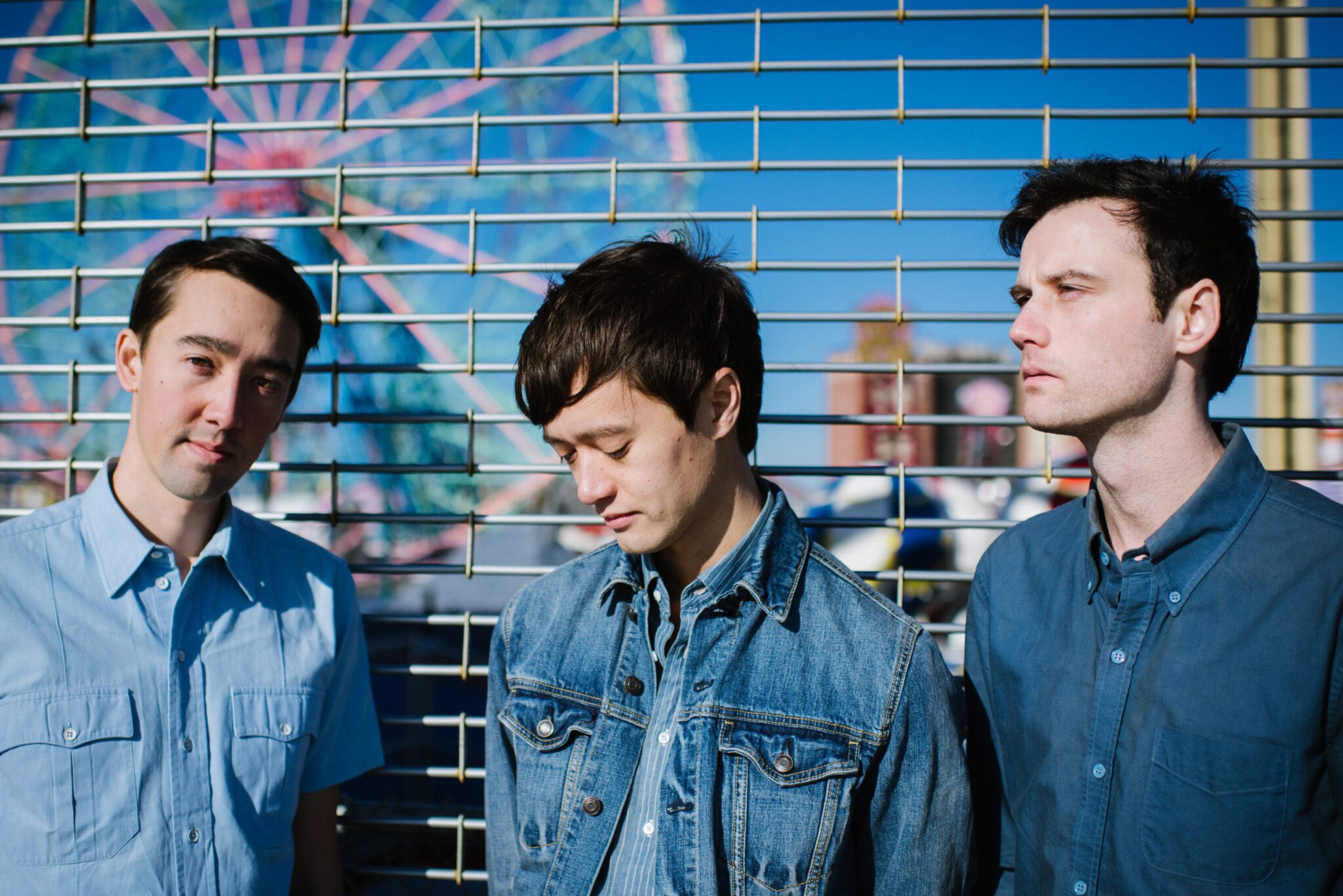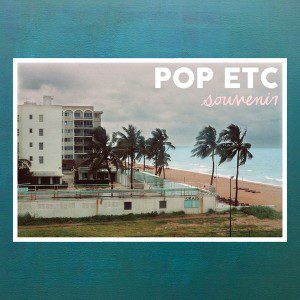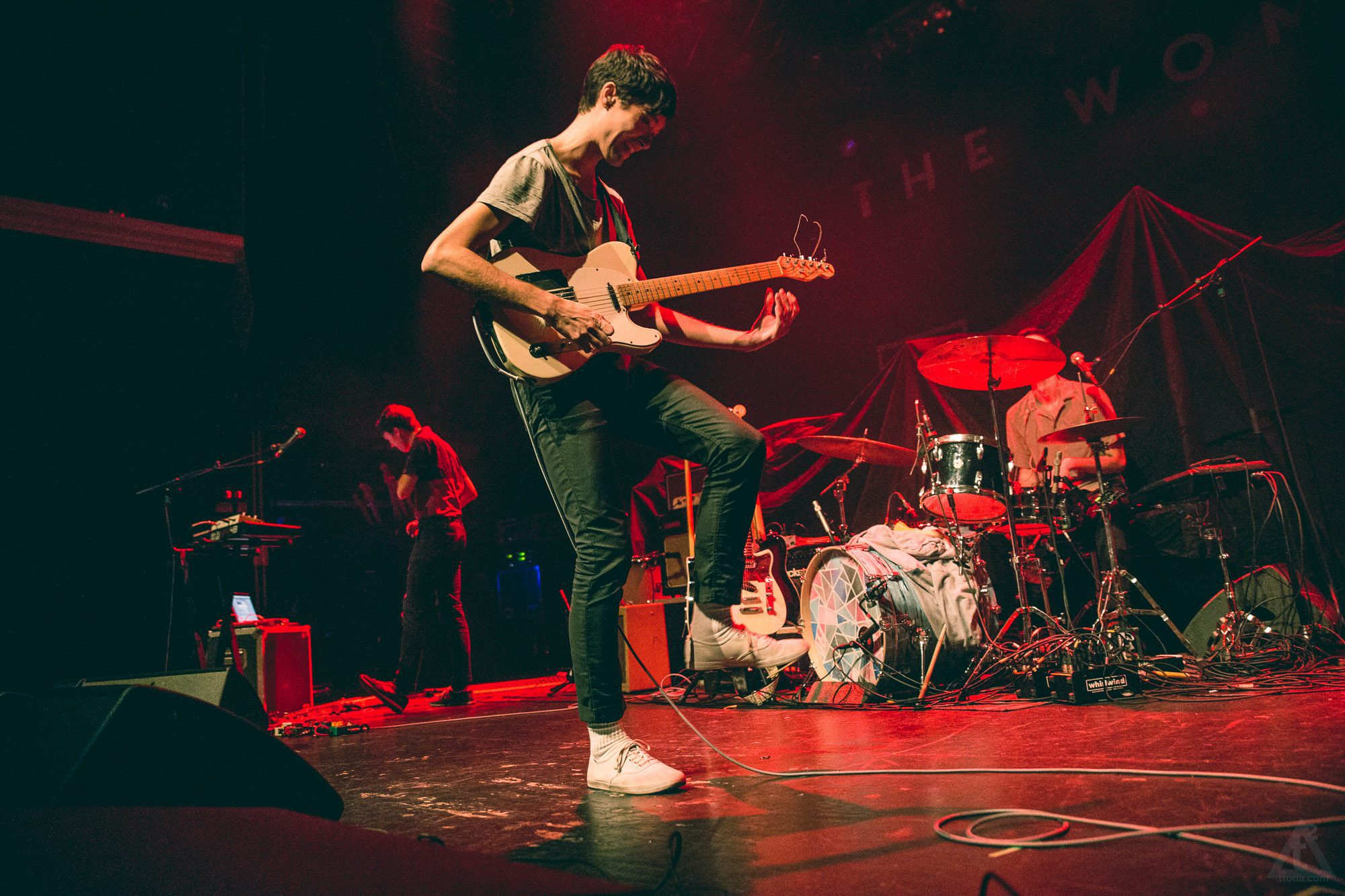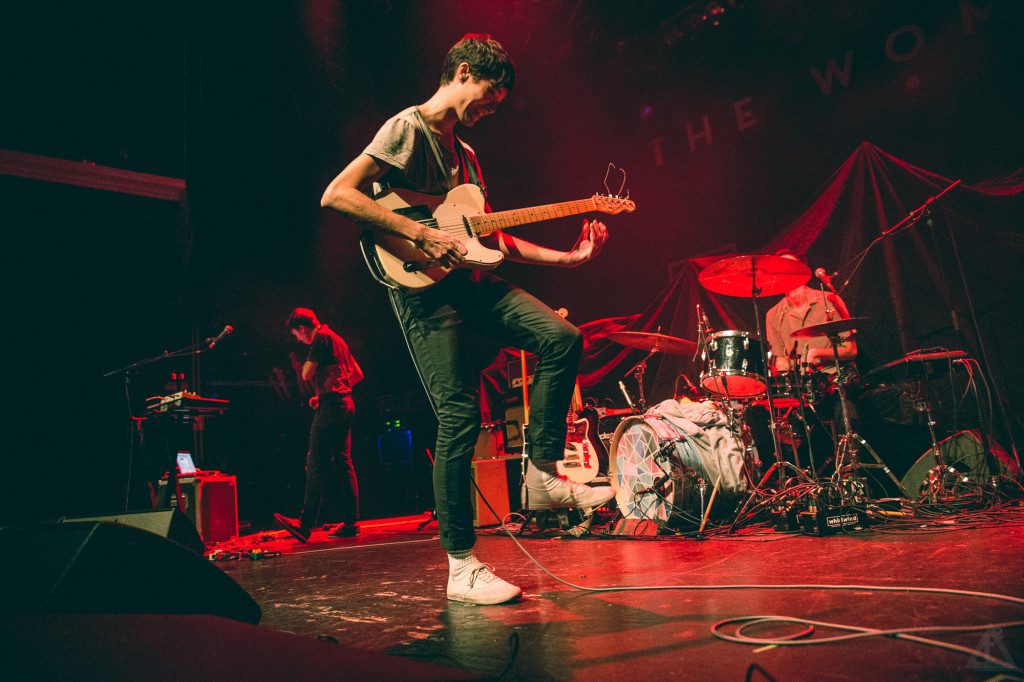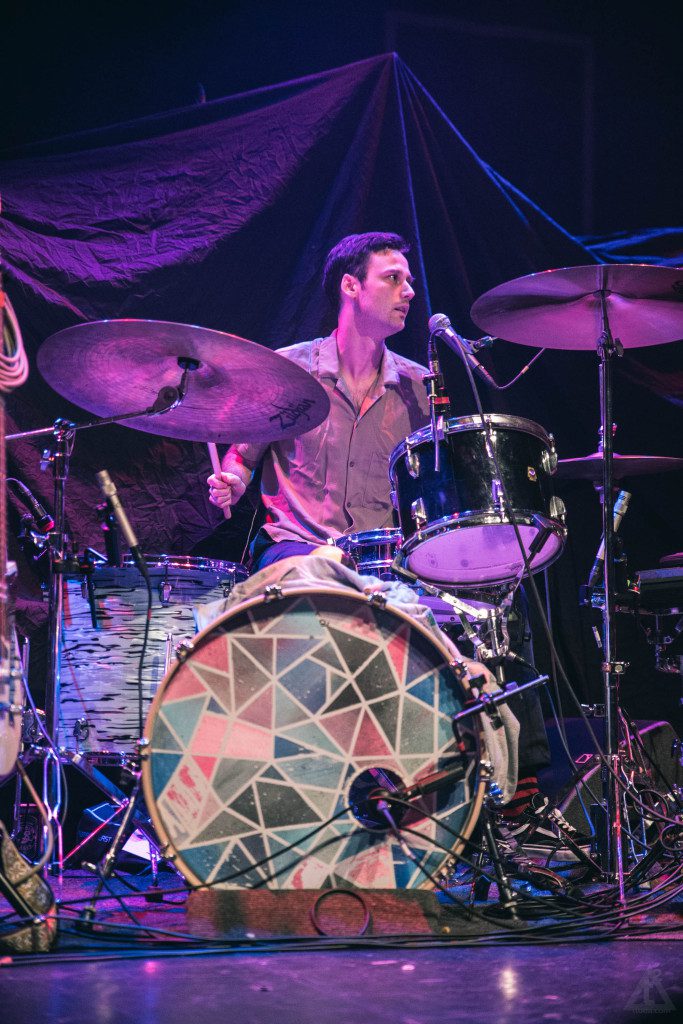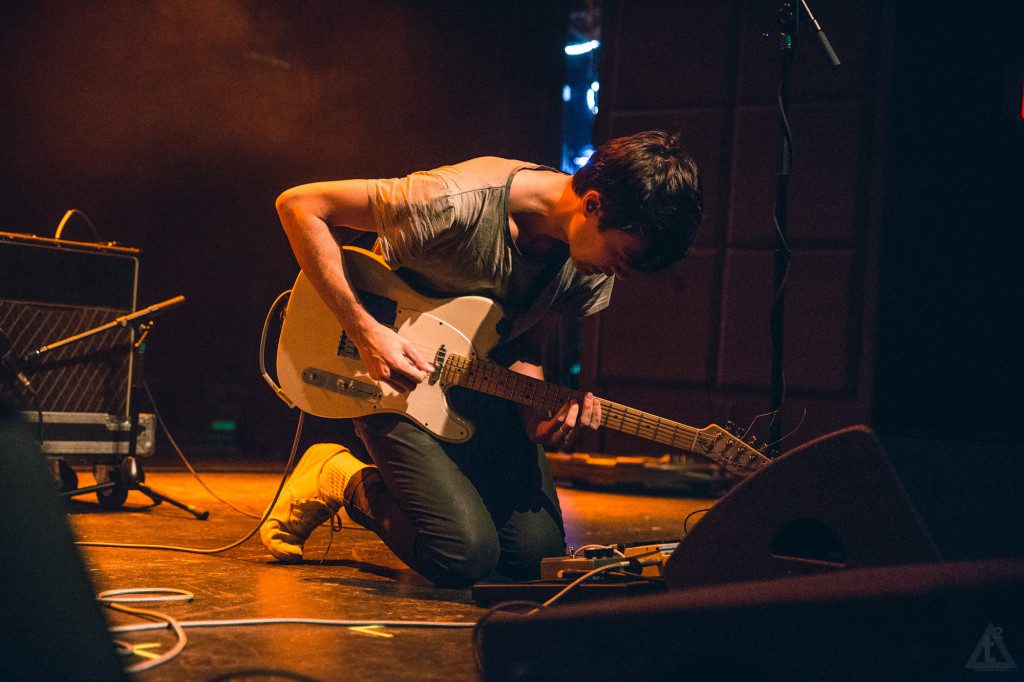INTERVIEW: Chris Chu of POP ETC

[fusion_builder_container hundred_percent=”yes” overflow=”visible”][fusion_builder_row][fusion_builder_column type=”1_1″ background_position=”left top” background_color=”” border_size=”” border_color=”” border_style=”solid” spacing=”yes” background_image=”” background_repeat=”no-repeat” padding=”” margin_top=”0px” margin_bottom=”0px” class=”” id=”” animation_type=”” animation_speed=”0.3″ animation_direction=”left” hide_on_mobile=”no” center_content=”no” min_height=”none”]
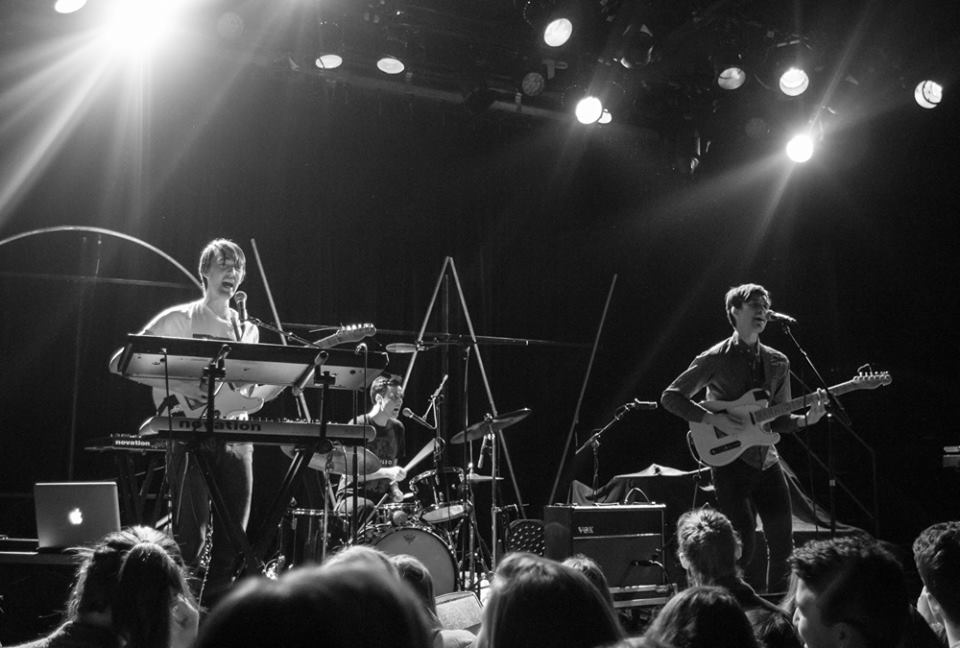
The dimly-lit green room at Music Hall of Williamsburg smells of cigarettes, but in an unassuming way, perhaps because Chris Chu of POP ETC kindly apologizes to my plus one, Caroline, and I in advance. I hardly noticed what he meant once we got up there, and no one else seemed to mind either.
Before we sit down, Chu offers us a drink.
“Water? Beer? How old are you guys?”
I feel nervous that if I say yes, I’m imposing, though I notice the array of drinks in the mini fridge: Tecate beer cans, water bottles, and a Snapple that Chu brings out to sip occasionally, post-interview.
—
Ysabella Monton for AudioFemme: Between The Morning Benders and becoming POP ETC, and even between the POP ETC album and Souvenir, I’ve noticed changes in the sound and your evolution as a group. You guys have had this awesome, loyal fan base, and you’ve done a great job of doing something new while maintaining that. What do you want your old fans to take from Souvenir?
Chris Chu: Well, love our fans and we do a lot to show them that. We respond to everything, we get people into shows all the time and give away all our guest list spots. We’re thinking about our fans a lot, but when we’re making music, the idea of trying to cater to any kind of specific listener or demographic is just dangerous. So, for Souvenir, we took our time, wrote tons of songs, and waited until a family of songs or a sound just emerged from that. And we’re happy with it. I just think, if you’re catering to your fans or trying to do something with your previous sound or anything like that, at least for us, it feels really stale. It’s hard for me to honestly sing songs like that or go on tour to play songs if we’re not excited about them. I think people notice that, so it would be a disservice to our fans to do the same thing over and over.
YM: Right.
CC: I’m not sure if that answered you’re question. [/fusion_builder_column][fusion_builder_column type=”1_1″ background_position=”left top” background_color=”” border_size=”” border_color=”” border_style=”solid” spacing=”yes” background_image=”” background_repeat=”no-repeat” padding=”” margin_top=”0px” margin_bottom=”0px” class=”” id=”” animation_type=”” animation_speed=”0.3″ animation_direction=”left” hide_on_mobile=”no” center_content=”no” min_height=”none”][laughs]
YM: No, I know what you mean. [laughs] Well, if you’re constantly having these new ideas, especially over the past three years — it doesn’t seem like it hasn’t been that long since the last record, but I think the change shows. What are you guys drawing inspiration from these days?
CC: It’s all over the place. For this last album, because we made the decision to take our time and approach it really patiently, we traveled a lot. For the last couple of years, I spent probably half my time in Tokyo, where I was working on other projects. So that was a huge difference, just working with people in Japan and being introduced to all this Japanese music. That was amazing, because there’s bands that are equivalent to The Beatles here that no one knows outside of Japan. Like, the number one albums in Rolling Stone Japan. I felt like a kid in a candy shop discovering that.
—
Something about inspiration leads us onto a tangent, reminiscing about 80’s music. I use “reminiscing” lightly, since neither of us were actually spinning those records through the decade. As Chu explains, “It’s similar to some of the ways we became interested in Japanese culture with rediscovering that music from the 80’s. We’re too young to have grown up with it, but our parents listened to it and we knew about it.”
I tell Chu a story about being in the car a week ago with my mom, listening to the likes of Tears for Fears, Spandau Ballet, Culture Club. Just for fun, I threw in “Running in Circles” from Souvenir.
“A seamless transition,” Chu laughs.
My mom thought so too. I tell Chu her review of the song: “I’ve never heard it, but I bet it probably played in the disco.”
—
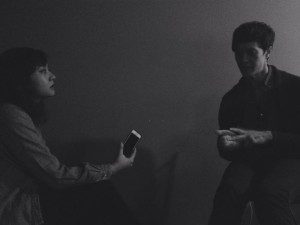
CC: That’s amazing. Similar to how I was describing the stuff in Japan, the cool thing about the 80’s is that it didn’t happen long enough ago that it’s been canonized in the same way. I grew up listening to The Beatles, The Beach Boys, Neil Young and all that stuff, Dylan. It’s so long ago that there are so many lists, so much critical discourse about music from the 60’s and you can still go and explore it yourself, but in general, it’s like history’s been written whereas with the 80s, there’s hit songs here and there but there’s a lot of records that people just haven’t given fair due because not enough time’s passed. Tears for Fears, for instance, I feel like people only know the four or five singles…
YM: Tracks like “Everybody Wants to Rule the World.”
CC: Yeah, and that’s one of my favorite songs, ever. Not knocking those songs, but I think that got us excited, like we could go back into the 80’s and write our own history and find things that spoke to us. It makes sense because we’re always listening to pop music. It’s like going into Cyndi Lauper records and Madonna records — again, people know the singles, but there are so many good album tracks.
YM: Definitely. Along with the 80’s influence I noticed some R&B as well in a few songs. I listened to “I Wanted To Change The World But The World Changed Me” and immediately the guitar at the beginning reminded me of “No Scrubs” by TLC.
CC: Yeah. [laughs] Actually, somebody else told me that, and we didn’t think about it, but it totally makes sense. It probably subconsciously made its way in.
YM: Was R&B something you were also listening to growing up?
CC: Yeah, I mean, growing up in the 90’s, you kind of couldn’t escape it. But with every song, especially from a production or sonic standpoint, we never wanna make anything that feels too dated. We’re happy to wear our influences on our sleeves, and it’s only better if people use our music as a gateway to all these 80’s bands that we love. We’re covering Tears for Fears in these shows and I’m sure especially younger kids don’t know that band, and we’d love for them to check it out. With “Running in Circles,” for instance, in the beginning it feels really 80’s, but then in the chorus, the way the guitars kind of sit in the mix, the sound of that feels almost more 90’s rock to me. Then in “I Wanted To Change The World But The World Changed Me,” we were using kind of deeper, subby, 808 kinds of sounds that have that hip hop and R&B influence for sure.
—
As he describes that process of putting together different sounds from different eras, there’s a bit of a twinkle in his eye. It becomes clear very quickly that he’s rightfully proud of what POP ETC has accomplished in this regard.
“We love music,” Chu says, “so we’re just listening to stuff all the time and putting it all together.
I ask if that’s where the “et cetera” comes from, since the music they make transcends the meaning of the word “pop” on its own.
“Yeah, we were very intentional about choosing that name,” says Chu. “When we chose ‘The Morning Benders,’ we didn’t even think it would be a real band. But with ‘POP ETC,’ we like the idea of it. Not only does it kind of feel like a genre, so we can say we play “pop et cetera,” but we like it as something bigger than a band, like a kind of concept.”
Especially seeing as “pop” tends to have a negative connotation nowadays, the way that POP ETC have branded themselves is an effective, cohesive labor of love.
“We’re making shirts and stuff, we love it from a design perspective,” explains Chu. “Now, we’re putting things out through our own imprint called ‘POP ETC Records.’ I like how it fits into all these different arms. It all serves the music. And we do play ‘pop et cetera,’ that’s our genre.”
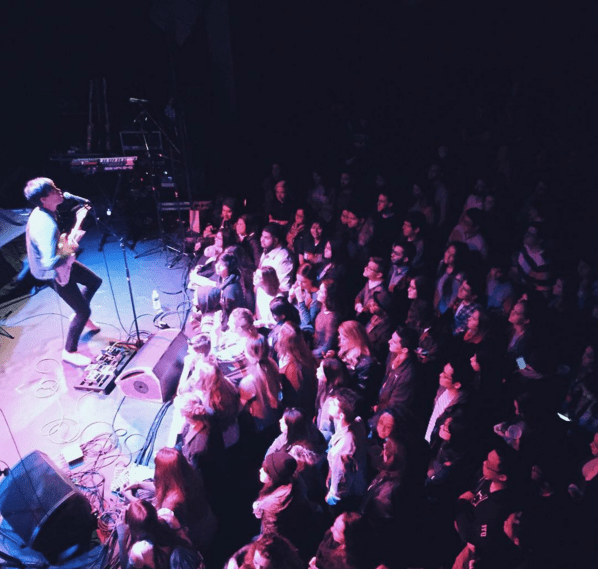
—
YM: Since you mix genres so effectively and all these different aspects go into it, when you have an idea for a song, how does that become a collaborative effort?
CC: Well, it actually changed substantially for this record. Especially with The Morning Benders, probably because I was younger and scared of letting go of total control, I wanted to wear all the hats and try to engineer it, mix it, produce it, and direct everyone exactly how to play things. With this record, and with my brother in the band, and Julian, who I’ve known for half my life, I really trust them. I’ll still write the core of a song by myself, and they give me very honest and merciless feedback. They’ll often be like, “We don’t like this,” and I’ll trash it, or, “The chorus is working, but the rhythm in the verse isn’t,” something like that. They help curate the songwriting even though they’re not writing lyrics or melodies that much. Then from a production standpoint, everyone plays. Julian is just a natural drummer, and as he’s playing drums, he starts guiding a song in a certain way from his style and his idea of what he likes. So yeah, I think this is the most collaborative record we’ve ever made.
YM: Does that have to do with it being recorded in the apartment?
CC: Yeah, that’s a huge factor. I get kinda stressed out being in a studio. I mean, you can find a great studio and make it warm and cool and if you can kind of bunker down for a month or something and you can feel comfortable there, but it’s just harder and harder to do that these days…I just always felt, especially with vocals and things that I wanna do in a really heartfelt, personal way, it’s kind of odd to do it in a studio where you don’t know the space or you don’t know anyone. There’s assistants standing around, staring at you or whatever. We just liked kind of being at home and having the freedom to really be patient. If I wanted to geek out over a certain way I sung a line or something for a couple hours, I could do that, whereas in a studio, you feel bad because you’re having an engineer do this thing over and over, and you just wanna get on with it.
YM: So did you not bring too many other outside people into it?
CC: No, no. We ended up having a couple of people mix it, so we sent it off for that phase just because we thought it would be nice to get some clarity. We ended up spending so much time on this record that we all felt like we were too close to have clarity on organizing sound. But we produced everything and played everything ourselves.
YM: So in the last three years, it wasn’t like a, “We spent most of this time writing, most of this time recording…”
CC: That’s the thing with being able to record at home now, it’s all much more ambiguous and those lines don’t really exist. When we did our first record, it was all the tape and we knew that we’d be going into the studio with not much time so we’d learn all the songs really well, went in and banged it out, and made a record. But with this it’s just everything is a moving part. You’re not committing something to tape where you can’t change it…The songwriting, and the recording and production are all intermingled. And some songs, we’d be fully recorded and go back and rewrite the chorus or a lyric or something. There’s substantial changes to every facet of a song.
YM: So how does that process reflect in the title of the album being Souvenir?
CC: We named it Souvenir for a lot of reasons, but in regards to that, because we took so much time and spent these years making this record, and it really felt stretched out across those years, it wasn’t like we did a couple of months and then vacationed for six, we were really tinkering with it. So I think it feels like a snapshot of what we were going through during those times. We liked the idea of having a souvenir that we could hold onto and keep with us going forward.
—
At this point, Jon, Chu’s brother and bandmate, pops in, waiting for a lull in the conversation. I turn to ask if he wants to add anything.
“Oh no, sorry to interrupt,” he says, “We just didn’t submit a guest list.”
Soon, drummer Julian Harmon comes in too, reaching for the beers and taking a seat on the couch with a few other people. There’s an air of ease in the room, no tension despite there being an interview going on and show time in around fifteen minutes.
“I thought Christine would’ve done that, but I will send it to you,” says Chris
“I’ll send that to you now,” says Chris, and Jon thanks him and apologizes again. “Okay, I sent it to both of you guys.”
“Are you guys doing an interview?” Harmon asks.
“Yeah, and we’re recording,” says Chris, jokingly adding, “So get the beers, and go.”
They leave the room and I get nervous, as it seems like I’m intruding on their time to hang out before the show.
“I mean, the only other thing I was wondering was…” I begin.
“It’s fine! Take your time,” he reassures me. “Don’t worry about them, there’s always something going wrong.”
—
YM: What kinds of things do you want new people who are discovering your music to draw from?
CC: That’s a good question. I don’t know.
YM: Not that you have to peg it for anything specific.
CC: I mean, obviously we put so much time into this record, I hope that people connect with it. In the same way that it’s a souvenir for us and we have it for these times, I like the idea of people having it — and for me, this is how music works in my life — as I’m living and listening to a record, my life experiences get kind of wrapped up in that, so ideally, that was what would happen. It could be a souvenir for other people.
YM: Yeah, definitely.
CC: To bring it full circle with what we were talking about early on, I really want fans to know how much we appreciate them caring about what we’re doing. I would like them to connect with us, especially with all the social media ways you connect with fans directly. I really think that it’s a blessing that we get to make music all the time for a living. We really do believe in that exchange and we’re feeding off the energy of our fans. Their support really does affect us and our music.
[fusion_soundcloud url=”https://api.soundcloud.com/tracks/243311674″ params=”auto_play=false&hide_related=false&show_comments=true&show_user=true&show_reposts=false&visual=true” width=”100%” height=”450″ iframe=”true” /][/fusion_builder_column][/fusion_builder_row][/fusion_builder_container]

